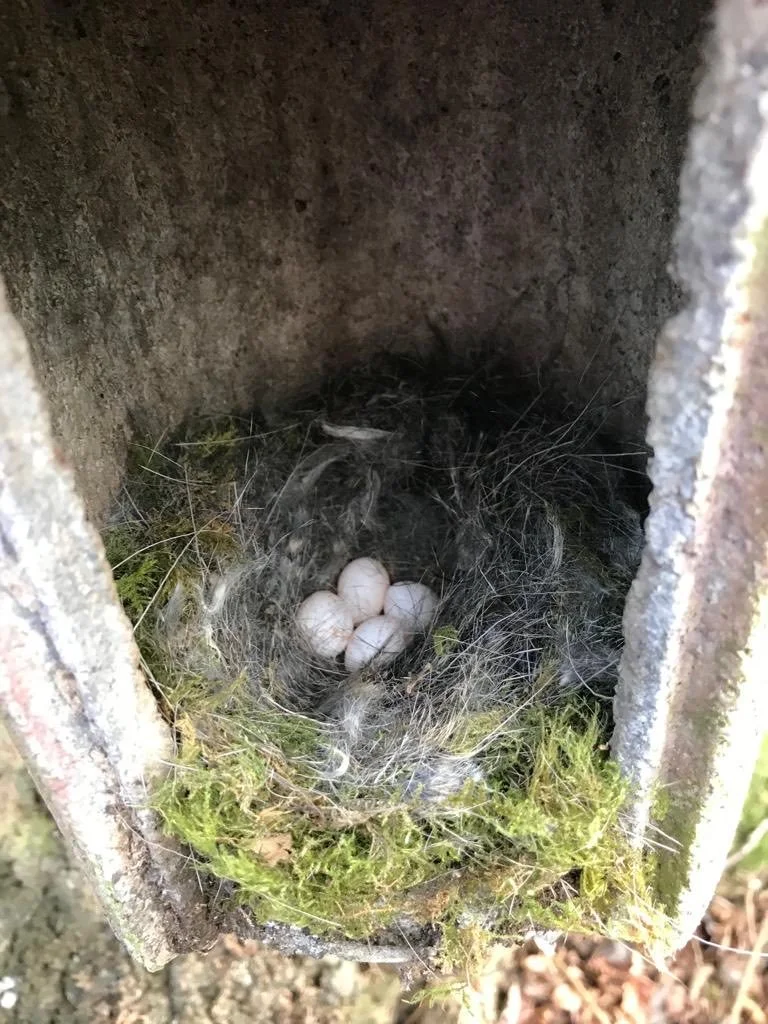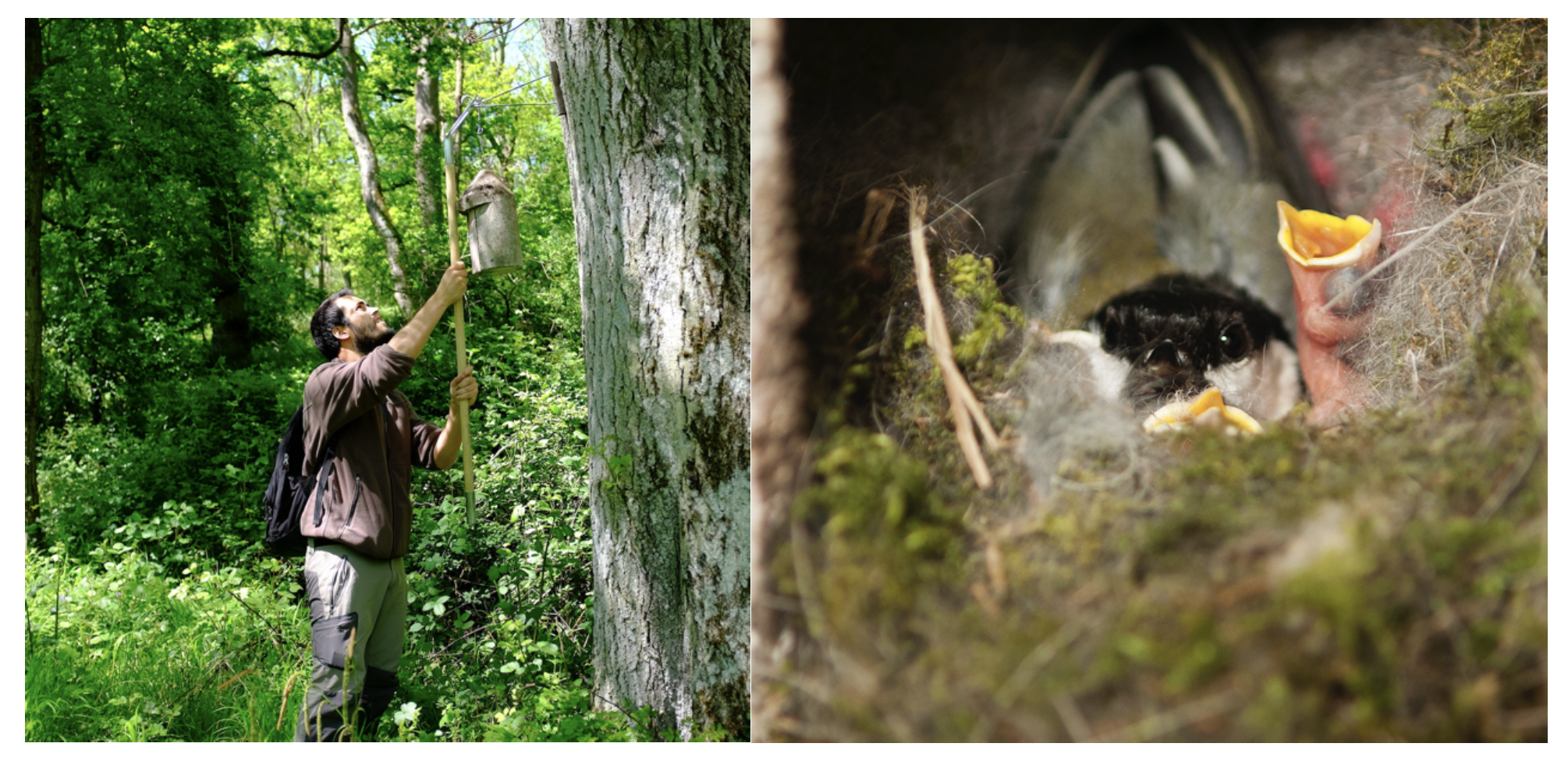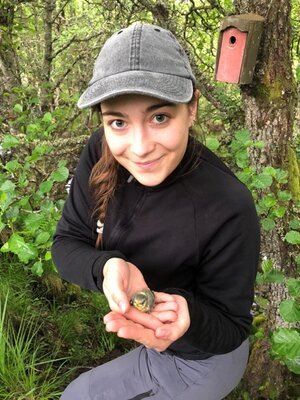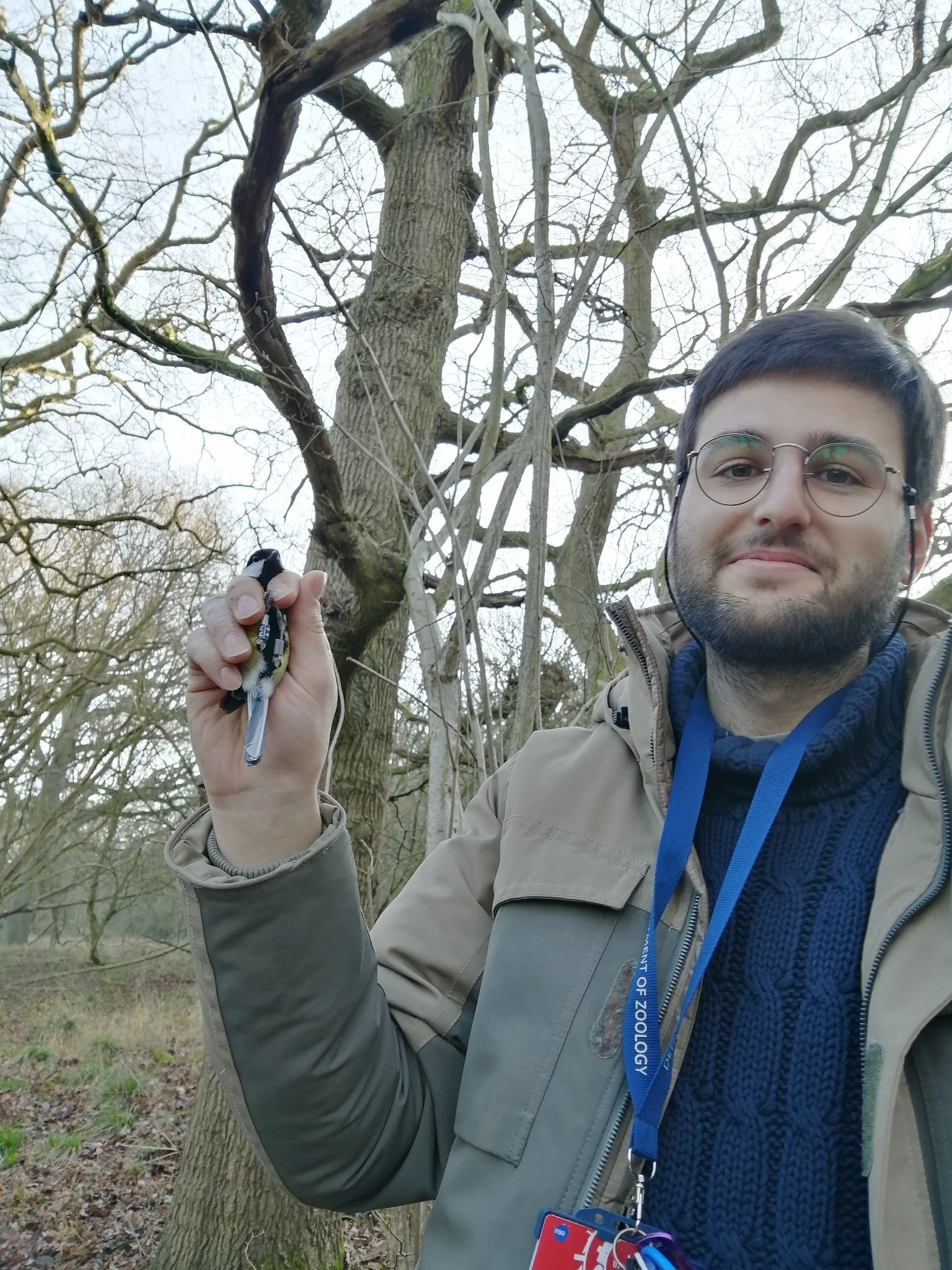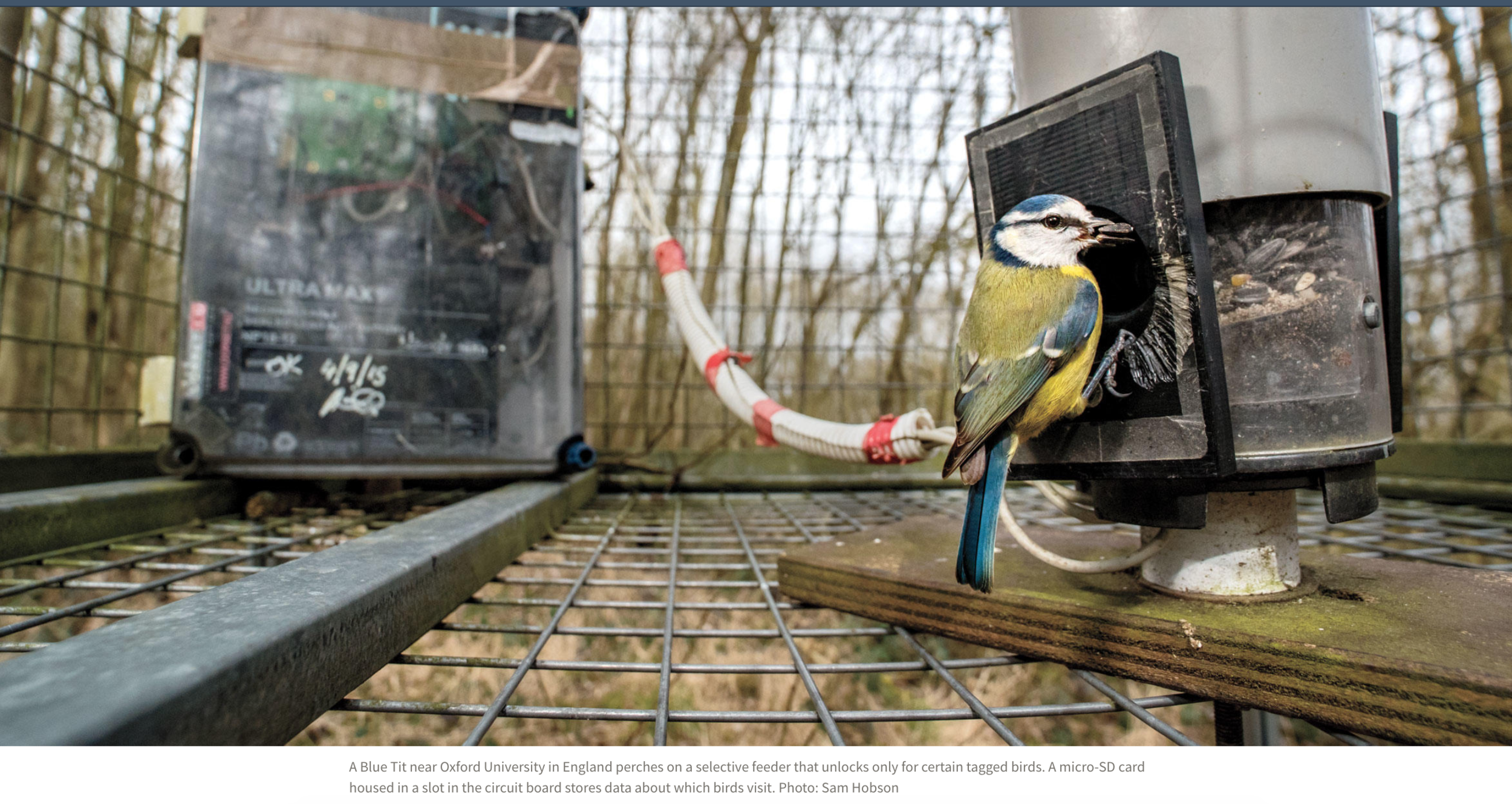News
December 2023: We are recruiting! We'll soon be advertising a post to join the Wytham Tit Project in early 2024 - please get in touch if interested (see details below).
June 2023: Another field season in Wytham Woods draws to a close. This year we had very high nestling survival and plenty of caterpillars (no sign off population numbers dropping yet). Here is the traditional field team photograph - it would be impossible to do this work without this fantastic team!
April 8th 2023: The first tit eggs reported today from the 76th year of data collection in Wytham. This is a little later than we have seen in recent years, but pretty in line with the cool temperatures we had throughout March.
December 2022: We are recruiting! We are looking for 6-7 FAs to work in Wytham Wood for 2-3 months spring 2023. 3-4 posts will be with the tit team, collecting breeding data, & 3 will focus more on tree & insect ecology. On site accommodation & salary provided! See below for further details:
April 27th 2022: Today we are celebrating the 75th Anniversary of the Wytham Tit Project!
On 27 April 1947, the first Great Tit egg of the year was counted in the University of Oxford's 'living laboratory' at Wytham Woods. It was to be the start of a deep and on-going relationship between the bird population and generations of researchers.
Seventy-five years later, in 2022, the year’s first Great Tit egg was counted on 28 March; almost exactly a month earlier than its predecessor from 75 years ago.
The Wytham Great Tit study is the longest continuous study of an individually-marked animal population in the world. It plays a key role in scientists’ understanding of how populations change in response to the environment – particularly how they are coping with changing climates.
Sir David Attenborough said: ‘I am delighted to hear of the 75th anniversary of the long-term Great Tit study in Wytham Woods. Having visited several times, I know how fundamental this study, and others like it, have been for our understanding of the impacts of climate change on the natural world.
‘Long-term studies like this require long-term commitment, and I wish the study – and its practitioners – a long and productive future.’
Professor Lord John Krebs, Emeritus Professor of Zoology at Oxford, and a member of the House of Lords Science and Technology Committee said: ‘In the late 1960s, when I started my DPhil on the Great Tits in Wytham, there was a remarkable “long-term” record of the population, which I analysed to understand what factors determined the number of birds in the population.
‘At that time “long term” meant about 20 years. Now, thanks to the foresight of those who started the study, and many generations of field workers, there is a truly unique record which will continue to yield novel and important insights into the ecology and behaviour of bird populations in the wild.’
Like many aspects of their biology, the timing of the laying of Great Tit eggs is influenced by large and small-scale factors, such as climate, social interactions and the health and behaviour of nearby trees, which researchers are beginning to understand in terms of potential vulnerabilities and resilience to changing climates.
Tits make excellent study species for ecological research as they readily take to nest boxes, breed at high densities, do not travel far from where they are born, and cope well with being monitored by scientists. Scientists can individually tag large numbers of nestlings (with unique leg rings) and follow them throughout their lifetimes.
Currently researchers use breeding data from 1209 fixed-location nest boxes in this Site of Special Scientific Interest to the west of Oxford, together with information on many other aspects of the ecology of Wytham Woods, collected by other scientists based at the University of Oxford. As the study has developed it has increasingly made use of new technology, including electronic tags, remote-sensing, and genome analysis to understand evolution.
Professor Ben Sheldon, who leads the Wytham Great Tit study, said: ‘A study of this duration is built on the work of hundreds of people, and it’s been a great privilege to build on their dedication year in, year out, to continue the study.
‘That continuity has enabled us to use many decades of data to understand how changes occur over time. One of the most striking changes is that the average Great Tit breeds three weeks earlier now than it did at the start of the study. This shift is a clear signal of the effects of climate change on one of our most familiar woodland and garden birds, and it is studies of this kind that allow us to work out what the consequences of such changes have been, and what they may be in the future.’
More than 70 PhD theses have been completed on this project and over 350 scientific papers published.
Five particularly significant discoveries from the Great Tit study over the last 75 years are:
1 Climate change is having clear effects on familiar biological systems.
2 Birds adjust their behaviour, and reproductive decisions, so that they produce optimal traits for their specific circumstances.
3 Individual birds can learn complex behaviours from each other, and this can lead to the emergence of cultural differences.
4 Evolution can occur over surprisingly small scales in space and time, even in birds.
5 Social networks connect birds across the whole population, but individual birds adopt very consistent positions in those social networks.
Future directions
Researchers say they know that climate change is driving large scale changes in the timing of seasonal events, affecting plants and animals across the globe. But researchers at Oxford are keen to know – how much does this matter for the survival and reproduction of these organisms, and ultimately how they will be affected by climate change?
New research, funded by an ERC Advanced Grant awarded to Professor Sheldon, aims to combine measures of the timing of leaf-out for hundreds of thousands of trees across the University of Oxford’s Wytham Woods, with data on insects and birds that rely on these trees for food. Oxford’s researchers are aiming to work out how much birds are influenced by effects at small and large scales, and how these interact in ecological networks. Grants such as the prestigious ERC Advanced Grant, announced earlier this week, to Professor Sheldon make an important contribution to answering these questions, but long-term studies require long-term funding. The researchers based at the Edward Grey Institute of Field Ornithology, within Oxford University’s Department of Zoology, hope that the next 75 years of study will be as productive and influential as the first 75 years.
April 28th 2022: We have our first eggs of 2022! This is the earliest so far. Only in the very early spring of 2019 have we seen earlier laying over the last 75 years.
December 2021: New research published this month, led by Lucy Aplin, now at the Max Planck Institute of Animal Behavior, describes how complex foraging behaviours in wild tits emerges from social learning and recombination of separate components. This work shows that although tits can socially learn complex foraging behaviours, these behaviours may need to be scaffolded by rewarding each component. Read the paper here.
December 2021: A study led by Samin Gokcekus, published this month, explores the drivers of passive leadership in wild great tits and blue tits. Read the paper here.
We’re recruiting Short-term Field Assistants for Spring 2022!
We are seeking to appoint 2-3 field assistants to work on the long-term Wytham tit study for two months in spring 2022. Duties will include collecting standardised data from nest-box breeding populations of blue and great tits, ringing parents and nestlings and collecting phenological data from trees and phytophagous insects, as well as inputting data collected in the field. Fieldwork begins in early April and continues to early June. The work is variable in intensity, with a peak in May that requires long (12 hour+) days in the field, but more flexibility away from this period.
Successful applicants will have accommodation provided on site, and, in addition, receive £1500 living expenses per month.
Successful candidates must have (or be qualified to obtain) a BTO permit to ring adult and nestling tits
Please submit application, consisting of CV, covering letter explaining relevant experience and motivation, and the names of two people who can be contacted as referees, by 15 December 2021 to ben.sheldon.pa@zoo.ox.ac.uk
Informal inquiries can be addressed to eleanor.cole@zoo.ox.ac.uk or ben.sheldon@zoo.ox.ac.uk
November 2021: The Wytham Tits is a member of the SPI-Birds Network and Database (www.spibirds.org)—a large-scale initiative that connects data from studies of wild populations of individually marked birds, based at the Netherlands Institute of Ecology (NIOO). This month SPI Birds published a research paper, describing this database and its uses and benefits, in the Journal of Animal Ecology. A year and a half after this network was established, SPI-Birds has recruited over 120 members, and currently hosts data on almost 1.5 million individual birds collected in 80 populations over 2,000 cumulative years. Read the paper here and check out their website here.
October 2021: Welcome to Dr Marta Maziarz, a NAWA fellow visiting us from the Museum and Institute of Zoology, Polish Academy of Sciences. Marta is studying the demography of the Marsh Tit, Poecile palustris.
September 2021: A recent study, led by Ella Cole and Charlotte Regan, shows that shifts in the timing of egg laying by great tits in response to climate change varies considerably across the woodland with the slowest nesting sites only having advanced egg laying by 7.5 days, whilst the fastest sites advanced by 25.6 days. This variation is linked to the health of nearby oak trees - birds breeding in areas with healthy oaks have advanced their laying by 5.4 days more than those breeding in areas with unhealthy oaks (read more here).
October 2020: Welcome to out new graduate students, Anett Kiss, Carys Jones and Joe Woodman. Watch this space for their first Wytham Tits research papers!
May 22nd 2020: Congratulations! Professors Sheldon recognised by The Linnean Society
Many congratulations to Professor Ben Sheldon who has been awarded The Linnean Medal in recognition of the Society’s appreciation towards his service to science in the field of Zoology.
Of his award, Professor Sheldon said: “I’m delighted to receive this award from the Linnean Society, which recognises and celebrates the central importance and ongoing relevance of Natural History as a field to make sense of Biology. Any success I’ve had is really due to the support I’ve had throughout my career from mentors, colleagues and students who have been such a rewarding community to work with.”
March 6th 2020: New project on great tit song
The first colour-ringed great tit of our DPhil student Nilo Merino Recalde's study on great tit song. Nilo’s DPhil research, supervised by Professor Ben Sheldon, will try to provide a more detailed understanding of how social, demographic and spatial factors influence how individual birds acquire their songs, as well as explore how cultural stability and novelty emerges at the population and species level in consequence.
November 26th 2019: Congratulations Dr Hillemann!
Wonderful to see another successful DPhil produced from Wytham (one of four in this picture!)
Congratulations Freddy!
January 10th 2019: Fully-funded PhD position available
We invite applications from potential candidates interested in any of the following areas:
(1) Social Behaviour & Ecology of Wild Populations
(2) Evolutionary Ecology of Reproduction in Variable Environments
(3) Evolution and Genetics of Quantitative Trait Variation
It is expected that research projects will involve some fieldwork and be based on the long-term study of tits in Wytham Woods, near Oxford. This population has been studied for more than 70 years, and there is a wealth of data to build analytical, computational, observational and experimental studies upon.
For initial inquiries, please contact Prof Ben Sheldon (ben.sheldon@zoo.ox.ac.uk) with a CV and a brief (1 page) outline of the research question(s) that interest you. Application procedure details here.
This project is fully-funded from Oct 2019, for 3.5 years and is open to UK and EU citizens. The application deadline is 25th January 2019.
January 3rd 2019: Field Assistants wanted!
We are currently looking for five field assistants to work with us this spring. Each post is available for two months full time, from approximately Monday 1st April to Friday 31st May 2019. The main duties of the post-holders will be to carry out fieldwork at Wytham Woods, near Oxford, and to assist in the collation and input of data. The hours are variable, and will involved several weeks of intense fieldwork.
Successful candidates must have (or be qualified to obtain) a BTO permit to ring adult and nestling tits, be able to demonstrate skill and enthusiasm for biological research as well as experience of fieldwork under arduous conditions, and of working as part of a team. Informal inquiries about the positions should be emailed to Dr Ella Cole (eleanor.cole@zoo.ox.ac.uk).
Salary: All field assistants will be accommodated in a large shared house close to Wytham Woods free of charge (utility bills and council tax included) and will each receive an additional £2,000 living expenses for the duration of the post.
Application: Please email a CV, together with a covering letter explaining your interest and skills plus the email addresses of two referees to Ms Lynne Bradley, PA to Professor Ben Sheldon (ben.sheldon.pa@zoo.ox.ac.uk).
Closing date: Sunday 17th February. All applications will be acknowledged. Short-listed candidates will be interviewed in the last week of February 2019.
December 29th 2018:
Audobon, the National Audobon Society journal, published a wonderful article about our research on songbirds’ social networks and more. Accompanied with great photos featuring traditional and modern data collection techniques in the woods! You can read the article here.
March 30th 2018: Reaching the Next Generation of Scientists
‘Frontiers in Young Minds’ is a new, free-to-publish, open-access journal which aims to make the latest scientific discoveries accessible to children. With the helpful advice of a primary school teacher, the EGI recently contributed an article explaining how great tits in Wytham Woods cope with losing members of their social group. You can read the article here.
This article is based on a study we recently published in Proceedings of the Royal Society B, which examined how wild birds adjust their social network positions in response to the experimental removal of their flockmates. This work helps us to understand resilience of animal social groups to disturbance (i.e., the disappearance of some group members). You can read the original article here.
For more information regarding how to make your own scientific research accessible to children, please visit the Frontiers in Young Minds information page here or contact Josh Firth.
October 20th 2017: Our recent paper on recent natural selection on great tits' bill morphology, published in Science, received a lot of media attention, among others from National Geographic, Scientific American, The Washington Post, and the BBC. Here is a link to the original paper.
October 10th 2017: Congratulations to Chris Perrins, on his 60th anniversary in the Department of Zoology - and the EGI!
July 21st 2017: The July edition of Blueprint magazine included an article celebrating 75 years of research at Wytham Woods, including an interview with Dr Ella Cole about the Wytham Tits project. Read the article here.
May 12th 2017: In a recent study, led by Katerina Johnson, we show that male great tits nest close to males with a similar personality. Listen to a BBC Radio 4 Inside Science interview here.
March 5th 2017: Freddy Hillemann introduced the Wytham Tit system to a keen audience at the annual meeting of Pied.Fly Net, a Citizen Science network monitoring pied flycatchers populations across SW England.
September 16th 2016: A new study published in Scientific Reports by Bernhard Voelkl and colleagues demonstrates how nonlethal predator effects can alter group composition within wild tit populations. These findings offers new perspectives on the key drivers of social behaviour in wild populations. Read the paper here.
September 12th 2016: A new study published in Ecology Letters by Josh Firth & Ben Sheldon assessed how whether great tits chose to breed close to their winter flock mates. Through tracking thousands of great tits over 3 years, the study showed that the birds nested nearest the flock mates they were most associated with over the previous winter. It also found that great tits arrange their territory boundaries so that they neighbour their most preferred winter affiliates. Through influencing where individuals locate themselves, social networks may shape the future environments that individuals experience. The findings also illustrate how social associations at one point in life can carry-over into an important stage later on. Click here to read the article.
August 4th 2016: New Scientist featured an article about Ben Sheldon and the Wytham Tit project. Click here to read the article.
July 25th 2016: This year's breeding data show that fledging success was relatively low, with blue tits faring worse that great tits. All species experienced a season decline in fledgling success, and this was particularly pronounced in blue tits.
July 21th 2016: Ella Cole and Keith McMahon took a break from the tits to join Chris Perrins for the annual Swan Upping on the Thames.
July 18th 2016: The tit team celebrated the end of another breeding seasons with the traditional group photo on a old sweet chestnut in Wytham Woods.
July 13th 2016: Ben Sheldon gave a plenary at the 8th European Conference on Behavioural Biology in Vienna.
July 11th 2016: Ben Sheldon, with help from members of the Wytham Tit team, ran a field ecology day as part of the Biological Sciences UNIQ Summer School.
June 21th 2016: Congratulations to Lucy Aplin, who was awarded one of the 2016 Jasper Loftus-Hills Young Investigator Award at Evolution 2016 in Austin, Texas. Watch her seminar below.
June 15th 2016: Congratulations to Josh Firth, who passed his DPhil viva voce today! Josh's doctoral thesis was on 'Carry-over and consequences of social connections amongst wild birds'.
June 13th 2016: BBC Springwatch featured our research on how tits match their timing of breeding with the local food peak. Watch the film here.
June 8th 2016: Emily Simmonds and Koosje Lamers spent a morning in the woods talking about bird reproduction with students from Pegasus Primary School.
June 1st 2016: A new study published in Biology Letters by Josh Firth, Ben Sheldon & Damien Farine monitored the spread of new information across the Wytham tit community whilst experimentally manipulating which birds could access the same resources as one another. This experiment reveals that birds were more likely to pass information to those they fed with, and also prioritised learning from these individuals in comparison to birds who could not access the same resources as themselves. This work illustrates how changes to social interactions can influence information flow, and how birds adopt learning strategies to prioritise information from relevant tutors. Read the paper here.
May 22nd 2016: BBC Springwatch came to make a film about the Wytham Tits - look out of this on their show (weekdays 8PM, BBC2) in early-mid June!
May 22nd 2016: Freddy Hillemann introduced the Bedfordshire Natural History Society to the Wytham Tits on a guided walk around Wytham Woods.
May 20th 2016: Emily Simmonds gave a talk at Garsington Primary School about great tit and blue tit life cycles.
May 16th 2016: Ella Cole talks to BBC1's Countryfile Diaries about tits and spring timing.
May 9th 2016: Wytham Tits took over the Biotweeps twitter account for the week to tweet about tit-related research.
April 23rd 2016: Ella Cole spoke about the Wytham Tit Project at 'The Woods Come To Town', an open event at the Oxford University Museum of Natural History.
April 22nd 2016: Congratulations to Nicole Milligan, who passed her DPhil viva voce will no corrections! Nicole's doctoral thesis was on 'Alternative foraging strategies in a wild population of tits (Paridae)'. Watch this space for publications!
April 11th 2016: Ella Cole was filming with in Wytham with BBC Countryfile Diaries. Look out for a piece on spring timing in the Wytham Tits on Monday 16th May!
April 10th 2016: We had our first Wytham tit egg of 2016, laid by a blue tit in Marley Plantation.
April 6th 2016: Congratulations to Chris Perrins who was awarded the BOU Union Medal from the British Ornithologists’ Union Medal for outstanding services to the BOU and outstanding contributions to ornithology!
April 4th 2016: A recent paper published by Ross Crates and colleagues in the Journal of Avian Biology explores the consequences of garden feeders for the reproductive success of tits. Over recent decades, more and more people have begun feeding wild birds, and it is now a multi-million dollar global industry. Through tracking how thousands of uniquely RFID-tagged tits in Wytham Woods access sunflower feeding stations that were open on weekends through the winter, the research team show that individuals differ consistently from one another in how many sunflower seeds they eat on a week-to-week, and year-to-year, basis. Further, consumption of supplementary food throughout the winter did not relate to individuals’ future reproductive success. Therefore, carry-over effects of human-provisioned food onto breeding bird populations either do not occur at the individual-level, or can be mitigated through a non-constant feeding regime. Read the paper here.
April 1st 2016: Ada Grabowska-Zhang and colleagues published a paper in Behavioural Ecology investigating the social structure of a population of juvenile great tits in Wytham Woods, after they have dispersed from their natal nests. They showed that, despite considerable dispersal, sibling pairs associated more often than expected by chance. Birds were also more likely to flock with individuals from natal nests near to their own, and individuals that fledged at a similar time of year. These results suggest that the structure of the winter population is shaped by limits to dispersal, and that there is significant kin structure in our great tit population. Read the paper here.
February 29th 2016: A recent paper published by John Quinn and colleagues in Philosophical Transactions of the Royal Society B presents the first large-scale study to examine factors underlying individual variation in innovative problem-solving ability, using the Wytham great tit population. Problem solving ability was measured in 831 individuals, temporarily taken into captivity. Differences were linked to age, personality and natal origin (whether a bird was an immigrants to Wytham or locally-born), but were not inherited from parents to offspring. Ability was also influenced by natal environment; individuals performed worse when born in poor-quality habitat, or where local population density was high. Read the paper here.
January 25th 2016: An international collaboration, lead by the Netherlands and the UK, and involving the Wytham Tit Project, published the great tit genome in Nature Communications. This genome assembly details genome evolution, selection, demographic history and remarkably low population structure across multiple populations of the great tit, and suggests that selection has disproportionately targeted genes associated with learning and memory. Read the paper here.






